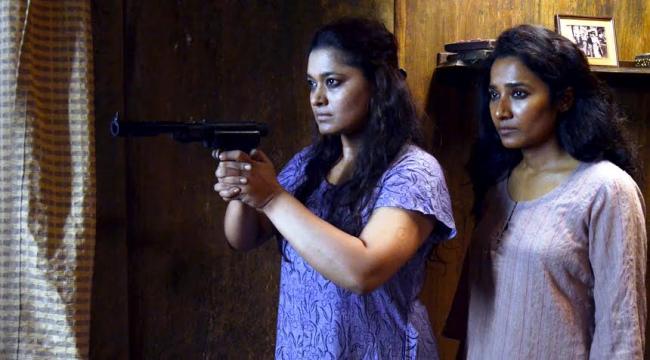
KIFF showcases women directors at best
Most women directors do not quite care for the word 'women' used as a prefix to the word 'director' because they feel this might ghettoise them further into a gender trap. But the present focus highlights an important feature of cinema - compared to men directors, women directors can almost be counted on one's fingers so unless they are given special focus at least for another couple of decades, they will not find space for showing their work to a discerning audience.
In this scenario, therefore, the 20th KIFF's decision to focus on women directors from across the world for the International Competition Section needs to be applauded because this is a 'first' in the history of film festivals in India. The prize money - Rs.51 lakh - is reportedly the highest ever award in India bestowed in a competition at a film festival. It will surely come in handy for the winner to make her next film - partly at least.
Contemporary women filmmakers are not confined to dealing with issues and subjects exclusive to the woman question anymore as the 20th KIFF Women's Focus reveals. The films entered are Tales directed by Rakhshan Bani Etermad (Iran), Eyes of a Thief by Najwa Najjar from Palestine, The Rice Bomber by Cho Li from Taiwan, Italo Barocco by Alessia Scarso from Italy, Cure – The Life of Another by Andrea Staka from Switzerland, Ciudad Delirio by Chus Gutierrez from Columbia, 40 Days of Silence by Saodat Ismailova from Uzbekistan, Self Made by Shira Geffen of Israel, Supernova from The Netherlands by Tamar van den Dio, Delight by Jitka Rudolflova from Czech Republic, Maneater by Natalie Saracco from France, A Place called Home by Maria Douza from Greece and Chhoti Moti Batein by Sohini Dasgupta from India.
In an environment where certain forms of representation are culturally dominant, such as mainstream and off-mainstream cinema directed by men, alternative forms have a tendency to be interpreted as a challenge to dominant forms even if that was not their creators' intention. None of them have consciously sought to "mobilize the cinema in the service of women's liberation" so to speak.
Among them, in a manner of speaking, had they been more pervasive, consistent and a bit more prolific, they might perhaps have offered some challenge to dominate cinema. But in a country like India where the number of films produced nears a thousand every year, a couple or more films made by a handful of women directors can hardly scratch the surface of dominant ideologies perpetrated by male directors. Nevertheless, they have it in them, to move beyond modes of expression prevalent within patriarchal ideology.
There is one entry from India. Sohini Dasgupta's maiden film Chhoti Moti Baatein. It is a strange film that twists the perspective of a true human tragedy into two women's search for new space in their lives. It is based on two sisters in Delhi who shut the door to the world outside, traumatized by their father's death. Sohini offers an alternative reading of shutting the door to the world outside by showing how they evolved a new world within the four walls of their apartment along with their dog Lucky and tried to discover their lives in a new light for the first time.
Delight by Jitka Rudolflova from Czech Republic is a Goddardian take on a possible scientific reality where the female protagonist who moves in different worlds connecting mainly through SMS messages, tries to prove that twins can be conceived of two different fathers! However, not being Goddard, the director seems to have been unable to get the message across.
Cure – The Life of Another is a psychological tale of two teenage girls who meet in class and begin to explore their sexuality and their sexual orientation. When Linda, the softer one, pushes the other accidentally over a cliff, her deep pangs of guilt come across in her becoming her dead friend from time to time. How does she cope with this schizophrenic situation? That is the climax of the story.
Structurally, the film cuts back from the past to the present and back to the past till it takes a slight time-leap showing Linda having gone to her mother for good, having exorcised her guilt and her double identity. Tales from Iran is a brilliant collage of different character-driven stories strung together through a filmmaker trying to document slices of life that try to span different human relationships and interactions.
Within this happily changing positive and optimistic scenario, it is fair to state that these women have the power, the insight and the talent to move beyond modes of expression prevalent within a patriarchal ideology. Yet, it is also true that, in an environment where certain forms of representation are culturally dominant, (such as mainstream cinema or parallel cinema directed by men), alternative forms have a tendency to be interpreted as a challenge to dominant forms, even if they are not challenging, either by intention, or by accident.
Support Our Journalism
We cannot do without you.. your contribution supports unbiased journalism
IBNS is not driven by any ism- not wokeism, not racism, not skewed secularism, not hyper right-wing or left liberal ideals, nor by any hardline religious beliefs or hyper nationalism. We want to serve you good old objective news, as they are. We do not judge or preach. We let people decide for themselves. We only try to present factual and well-sourced news.






